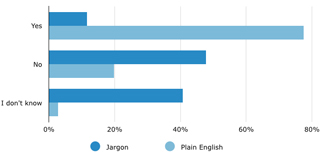 Ah yes, the mighty widget. The widget has been an integral part of committee meeting proposals and cocktail napkin doodles alike. Widgets as surrogates for actual products are necessary to navigate business school scenarios of cost benefit analysis, supply chain management, and inventory management, too. But when mythical product placeholders and obscure industry terminology begin to leave the classroom and boardroom, people tend to get confused. And if there is one thing that seems to be universally true in business, it’s that assailing your prospects with technobabble is rarely rewarded with buying questions.
Ah yes, the mighty widget. The widget has been an integral part of committee meeting proposals and cocktail napkin doodles alike. Widgets as surrogates for actual products are necessary to navigate business school scenarios of cost benefit analysis, supply chain management, and inventory management, too. But when mythical product placeholders and obscure industry terminology begin to leave the classroom and boardroom, people tend to get confused. And if there is one thing that seems to be universally true in business, it’s that assailing your prospects with technobabble is rarely rewarded with buying questions.
Nobody Likes to Feel Talked Down To
A recent study of over 4,000 people by Daniel Harris from Software Advice, an online software selection service, found compelling arguments against overusing jargon in sales and marketing communications, especially in emerging or unfamiliar technologies. The study chose to use VoIP as a key area to focus on due to the hosted phone service industry’s tendency to overuse unfamiliar, overly technical language.
Jargon that is unfamiliar to an audience makes them feel uninformed, and in a business setting, that can be a pretty exposed feeling. Not terribly surprising, though fairly conclusive, was the fact that when people don’t understand the terminology used to describe something, they are measurably disinclined to make a purchase. What makes this revelation more interesting, though, is that this phenomenon seems to apply to technologies that the participant was already familiar with, but had been presented in an unfamiliar way. Using email as a topic, researchers saw a significant difference in reported familiarity based on the terminology they used to pose their questions.
Know When You’ve Transitioned From Familiar to Far Out

Respondents were confused when asked if they had ever sent an email using obscure, technical language
Another point that this study brings up is relevant to a recent Federal Communications Commission report that cited that, while VoIP subscription has steadily grown for residential use, the adoption rate for business has not reflected similar increases. In light of what we know about jargon and how it impacts buying decisions, the fact that residential phone systems need fewer lines and features than a business begins to make sense. When a residential hosted phone subscriber is shopping for what is comparatively a simple service, VoIP providers are able to keep the terminology simple and direct. A problem arises, though, for the business owner who is blind sighted with the technical explanations for extension routing, advanced queues, and business failover. If the business owner has even a basic understanding of VoIP technology’s benefits beforehand, when confronted with technobabble, he or she is still likely to continue suffering through an expensive and antagonistic relationship with their traditional copper phone line provider rather than trudge through the new terminology.
Focus on Benefits, Not on Features

Respondents who were already familiar with the technology were less inclined to save money on a VoIP system when the question used too much jargon
One set of results from the study that highlights this fact was when researchers posed questions about saving money on a VoIP phone system. Regardless of the current level of knowledge about hosted phone service technology the respondent had, their answers were severely impacted when the questions were more technical in nature.
“Even when respondents understood that SIP trunking would somehow save them money on their phone bills, they were still far less likely to consider the service when we employed a technical rather than a functional definition.” Harris added in his synopsis.
Many conclusions can be drawn from a study, but the accuracy with which this one seems to capture what we’ve all already known is pretty remarkable. People don’t go online shopping for a new SIP (session initiation protocol) or DNIS (dialed number identification service). All they want is a telephone service that gives them the features they need at a price that works for their budget. VirtualPBX can offer businesses of any size just that. Widgets included at no extra charge.






